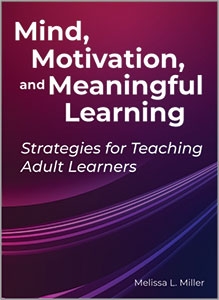Primary tabs
You don't need to be an ALA Member to purchase from the ALA Store, but you'll be asked to create an online account/profile during checkout to proceed. This Web Account is for both Members and non-Members. Note that your ALA Member discount will be applied at the final step of the checkout process.
If you are Tax-Exempt, please verify that your account is currently set up as exempt before placing your order, as our new fulfillment center will need current documentation. Learn how to verify here.
- Description
- Table of Contents
- About the author
Adults are attending college in record numbers every year. These students, many with families and careers, may have been away from an academic environment for many years and have unique needs in developing lifelong learning skills. Academic librarians have an important role as change agents in this dynamic learning environment through information literacy instruction, workshops, and individual consultations.
Mind, Motivation, and Meaningful Learning: Strategies for Teaching Adult Learners provides a blueprint that academic librarians can apply to their instructional design that facilitates a change in students’ motivation and learning strategies. It provides the tools necessary to teach learners to identify, evaluate, and apply appropriate cognitive, learning, and motivation strategies based on course content and a deeper understanding of the metacognitive component of meaningful learning. Five chapters explore the theories behind adult learning, culminating in a seven-unit curriculum scalable to a variety of learning domains complete with lesson plans, activities, assessments of the learning goals, and student reflections.
Mind, Motivation, and Meaningful Learning can help you identify the components of academic learning that contribute to high achievement; help students learn and practice effective learning and study strategies that lead to improved self-efficacy, self-regulation, and knowledge transfer; and improve instructional design for student, instructor, and academic teaching librarian success.
Dedications
Preface
Acknowledgements
Chapter 1. What’s the Problem?
Combining All the Pieces to Complete the Puzzle of Learning
Agency for Meaningful Learning—Academic Self-Regulation
Definition of Terms
Organization of the Chapters
Key Points
Example Activities
Chapter 2. Understanding Learning
General Theoretical Approaches
What Is Andragogy?
What Is Social Cognitive Theory?
What Is Motivational Systems Theory?
How Cognitive Science and Learning Theories Can Help Academic Librarians with Instructional Design
Key Points
Example Activities
Chapter 3. Understanding Motivation
Self-Efficacy and Self-Regulated Learning
Goal Orientation, Goal Setting, SMART
Mindset: Growth-Mastery or Fixed-Performance
Motivation and Metacognition
Emotions and Learning
Key Points
Example Activities
Chapter 4. Learning and Motivational Strategies to Promote Learning and Retention
Designing Overall Curriculum Goal, Outcomes, and Summative Assessment
Understanding Knowledge Types
Prior Attempts for Online Learning
Theoretical Foundations to the Curriculum Design
Cognitive Task Analysis (Information Processing Analysis)
Major Steps
General Instructional Methods Approach
Reading, Taking Notes, Studying, What’s the Plan? Overview of the Learning Activities/Units
Chapter 5. Evaluation and Meaningful Learning through Reflection
Implementation of the Evaluation Plan: Evaluation Framework
Evaluation Tools
Conclusion: Curriculum Purpose, Need, and Expectations
References
Appendices
Appendix A. Unit Lesson Plans and Materials
Lesson Plan and Developer’s Guide: Unit 1
Lesson Plan Curriculum Materials: Unit 1
Lesson Plan and Developer’s Guide: Unit 2
Lesson Plan Curriculum Materials: Unit 2
Lesson Plan and Developer’s Guide: Unit 3
Lesson Plan Curriculum Materials: Unit 3
Lesson Plan and Developer’s Guide: Unit 4
Lesson Plan Curriculum Materials: Unit 4
Lesson Plan and Developer’s Guide: Unit 5
Lesson Plan Curriculum Materials: Unit 5
Lesson Plan and Developer’s Guide: Unit 6
Lesson Plan Curriculum Materials: Unit 6
Lesson Plan and Developer’s Guide: Unit 7
Lesson Plan Curriculum Materials: Unit 7
Appendix B. Cognitive Task Analysis: Subject Matter Experts Success Strategies
Appendix C. Evaluation Instruments Pre-course Evaluation 1
Appendix D. Evaluation Instruments Post-Course Evaluation 2
About the Author
List of Figures
Figure 2.1: Andragogy in Practice
Figure 2.2: Triadic Reciprocity
Figure 3.1: Phases and Processes of Self-Regulation
Figure 3.2: Outline of the Necessary Steps for Effective Goal Setting
Figure 4.1: Features of Goals, Objectives, and Outcomes
Figure 4.2: Content Categories
Figure 4.3: First Principles of Instruction
Figure 4.4: A Schematic Training Blueprint for Complex Learning and the Main Features of Each of the 4C/ID Components
List of Tables
Table 3.1: Two Mindsets
Table 4.1: Knowledge Types and Activities
Table 4.2: GEL Lesson Structure
Table 4.3: Scope and Sequence Table
Table 4.4: Summary of Media Selection Considerations
Table 4.5: Specific Media Choices
Table 5.1: Indicators, Metrics, and Methods for External and Internal Outcomes
Table 5.2: Critical Behaviors, Metrics, Methods, and Timing for Evaluation
Table 5.3: Required Drivers to Support Critical Behaviors
Table 5.4: Evaluation of the Components of Learning for the Program
Table 5.5: Components to Measure Reactions to the Program
Melissa L. Miller
Dr. Melissa L. Miller is a faculty member at the University of Southern California (USC). Her primary roles are the head librarian for the Hoose Library of Philosophy and a humanities librarian. She is the subject specialist, collection development and research, for the USC Dornsife College of Letters, Arts, and Sciences departments of philosophy, religion, anthropology, linguistics, comparative literature, and the history of science and technology, and offers research consultations, information literacy instruction, and assessment for both the undergraduate and graduate levels.
Melissa is also a teaching faculty member for the Marshall School of Business, master of management in library and information science (MMLIS). As an assistant university professor, she teaches research and professional leadership applications for the internship program. Prior to USC, she worked in the corporate sector for nearly two decades (1991–2009), where she held several leadership positions.



